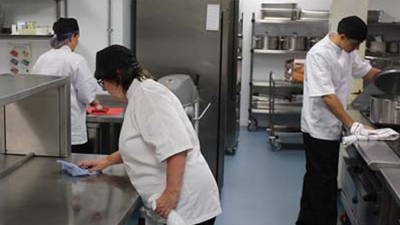Safeguarding e-Bulletin – 20th May 2021

Welcome to our news bulletin with a roundup of the latest safeguarding news.
Table of Contents
- What's new at SSS Learning
- In the news
- DFE launch education staff wellbeing charter
- Ofsted launch sexual abuse review
- New ways to prevent child exploitation
- County lines- emerging new models & exploitation threats
- Domestic Abuse Bill receives Royal Assent
- Veteran teacher barred indefinitely for prolific inappropriate activity
- 'Loophole' closed to protect teenagers from potential abuse from sports coaches
- Increase in child deaths linked to deprivation
- Thunderstorms
As you will be aware we are always asking you for the emerging safeguarding subjects you would like us to prioritise for our training production schedule. At the end of last year by far the most requested topics were supporting pupil mental health & wellbeing together with training for those appointed as designated leads. So, in response we brought together a team of experts and developed our Supporting mental health & wellbeing of pupils and Designated Mental Health Lead courses, released in January. I am delighted to say we have received fantastic feedback on both courses.
Although describing supporting children’s mental health and wellbeing as a priority in terms of central government priorities for some years, there has been a distinct delay in action. Way back, former Prime Minister Teresa May made a commitment to mental health CPD for schools and having paused the funding for training discussed last year, HM Government has only just announced there will be funding for up to 7,800 schools and colleges in England to train a senior mental health lead from their staff from September. Whilst this is a positive step forward, this only equates to approximately 30% of schools in England being able to access funds. Although there is a commitment to offer some additional ongoing funding by 2025 details of the roll out and how qualifying schools will be determined have not been released. What is clear though is that all educational settings feel this training is needed now.
This opinion is backed up by the results of a survey by commissioned by BBC Children in Need, published this month has found that children and young people across the UK are facing short, medium and long-term impacts on their mental health and emotional wellbeing, as a result of the Covid-19 pandemic. Findings report that more than two-thirds of children and young people aged between 11 and 18 believe that young people’s mental health in general has got worse as a result of the pandemic, with worryingly one in three not feeling comfortable to ask for help if they needed it. Now more than ever staff need access to high quality training and resources and this was our rationale for prioritising the release of our training courses at the start of the year. If you’re not sure about appointing a Designated Mental Health Lead now, why not watch my video which explains the benefits.
Following on from the success of our free resource Child Mental Health & Wellbeing-10 Top Tips for Parents(which has had over 1.8K views), this month we have released another video designed to support parents with their own mental health and wellbeing. Please feel free to share 10 Tips to support parental mental health & wellbeing directly with parents, place the link on your website or better still do both! Packed with lots of practical helpful information, there are a few surprises in there too- walnuts, who knew? (You will have to watch to find out).
In addition, our series of videos where our experts highlight the most common mental health conditions with practical tips for supporting children in educational settings is also available as a YouTube playlist.
Also new this month – we have released our new Level 2 Food Safety & Hygiene Training course, authored by Environmental Health Officers in line with the Chartered Institute of Environmental Health and Royal Society of Public Health syllabuses (Level 2 Food Safety and Hygiene).
Quite unlike any e-learning for Food Safety and Hygiene that you may have seen before, our course is specifically designed for canteen & kitchen staff and others who handle, prepare or serve food. With stunning 3D animation, our unique e-learning system provides a robust and highly effective way to ensure staff are trained to required legislative standards, fully compliant with statutory requirements. Topics include:
- Legal Obligations;
- Micro-organisms;
- Cross-contamination;
- Cleaning and Disinfection;
- Hygiene;
- Hygienic process controls;
- Food Safety Management.
It's important to remember that teachers and educators who facilitate the procurement and production of food within the classroom, should also undertake training to safeguard against illness. To meet this requirement we have also produced our Food Safety in Classroom Settings training course.
As you know, we are constantly striving to enhance our system processes and welcome your suggestions. In response, I can announce we have simplified the trainee menu to enable users to easily identify and access their courses, and to see how courses are related to each other. In addition, courses that have more than one part, e.g. Child Protection and DSL now have one certificate for the full completion of all modules rather than multiple certificates previously required to complete one course. We really value your input so please keep your comments and suggestions coming.
Best wishes
Sam
Sam Preston
Safeguarding Director
In the news:
DFE launch education staff wellbeing charter
The DFE have announced the launch of The education staff wellbeing charter which has been created by the education sector, including input from schools, colleges, Ofsted, teaching unions and the voluntary sector, to highlight staff wellbeing.
The voluntary charter, available from autumn, is designed as a platform for educational settings to publicly declare their support for, and set of commitments to, the wellbeing and mental health of everyone working in their organisations.
The format includes twelve commitments on education staff wellbeing by the DfE and Ofsted, with five key principles of shared understanding on the meaning and importance of wellbeing and of individual roles and responsibilities.
The key aims of singing up to the charter is to:
- show staff that their wellbeing is taken seriously;
- open a dialogue with staff about their wellbeing and mental health;
- create a bespoke staff wellbeing strategy;
- create and develop a wellbeing-focused culture.
Ofsted launch sexual abuse review
Following anonymous testimonials of sexual abuse, published on the website "Everyone's Invited", Ofsted have launched an immediate review of safeguarding policies in state and independent schools over responses to allegations of sexual abuse.
Gavin Williamson, Education Secretary, stated the review will look at 'the extent and the severity of the issue and ensure schools have appropriate processes in place to allow pupils to report concerns freely, knowing these will be taken seriously and dealt with swiftly and appropriately'.
The inspectorate will also ensure there is sufficient guidance on how allegations of sexual harassment and violence in schools should be dealt with and will address whether the current inspection regimes are strong enough to address concerns and promote the welfare of children.
This week, a survey of teachers commissioned for Good Morning Britain found:
- 73% of teachers had come across a range of behaviour including verbal sexual harassment, requests for naked pictures, sexual assault and rape;
- 38%, which included 16 % of primary teachers, had seen children watching or circulating pornographic material;
- Revenge porn and sharing of private sexual images without consent were mentioned by 29 per cent, while 14 per cent had come across upskirting.
The review is set to conclude by the end of this month.
New ways to prevent child exploitation
The Economic and Social Research Council are funding a new research project to study the safeguarding risks faced by young people outside their home and explore new ways of combating threats such as sexual and criminal exploitation and gang affiliation.
The £1.9m Innovate Project by the University of Sussex, will explore the work of six organisations each using one of three different frameworks for safeguarding and trauma-informed practice.
The three year project will involve researchers observing meetings and practices, interview young people, parents and professionals. The study will also examine organisational processes, systems, costs and outcomes to determine the current effectiveness of frameworks and the factors which lead to more innovative social care practice. The study will also engage stakeholders in turning the findings into policy recommendations and guidelines for good practice.
The three frameworks included are:
- Contextual safeguarding, as adopted by Devon Children's Services and Partners and the charity Safer London
- Trauma-informed practice at Brighter Futures for Children in Reading and North Lanarkshire Education and Families Service
- Transitional safeguarding with the Safeguarding Adults Board for Hackney and Sheffield Children and Families Services
In relation to the study, Professor of social work in the School of Education and Social Work at the University of Sussex, Professor Michelle Lefevre, stated:
“We are delighted to have the involvement of these six sites, who are at the vanguard of developing new ways of supporting young people, families and communities’ and ‘are confident that the learning from this project will inform innovation practice, improve the design and delivery of services, and enhance intervention experiences and outcomes for vulnerable young people and their families.”
County lines – emerging new models & exploitation threats
New research, Between the lines published by the National Youth Agency (NYA) has shown that the Covid-19 pandemic has changed the methods criminal gangs use to exploit children and young people. Gangs exploiting them to carry out criminal activity have adapted their approach, creating new risks. Such gangs have traditionally targeted children outside school gates however, in response to the national lockdowns and school closures, there has been an increase in the use of social media channels to target children.
The research describes the even greater challenge this creates for police, social workers and youth workers to protect children and young people and calls for a collective and creative response from all agencies.
As the report highlights, grooming via traditional apps, e.g. Snapchat and WhatsApp, where messages are encrypted or disappear presents a real difficulty in tracking contacts locally and across county lines. Platforms that offer 'secret chat' functions or where one account can be used simultaneously across multiple devices also present tracking difficulties.
Emily Aklan, chief executive of Serenity Welfare, echoes this point adding: ”A lot of them want to get out but they don't know how to and what [gangs] do is isolate them from everyone around them – they make false allegations against parents so they go away, stop them from going to school, from talking to friends, key workers, anybody. They groom them into their 'web'.“
Between November 2020 and February 2021, Serenity Welfare reported an increase in payments to vulnerable young people through PayPal. Chief executive, Emily Aklan explained: ”They seem to be grooming and exploiting vulnerable children online through Snapchat and sending money on PayPal. A lot of young people, especially the ones we have in care, don't have PayPal accounts so they're asking family and friends and people they may know to go into their PayPal account and withdraw this money.“
PayPal's statement is keen to reiterate that they have zero tolerance for the use of the secure payments platform to facilitate illegal activities and that they: 'review questionable activities reported to us, and discontinue our relationship with account holders found to violate our policies.'
The latest statistics present a worrying picture of child exploitation:
- There are over 2,000 county lines gangs across the UK (National Crime Agency)
- Police closed 102 county lines in September 2020 (National County Lines Coordination Centre)
- 27,000 children at high risk of gang exploitation have not been identified by services (Children's commissioner for England, February 2021)
- 2 million young people have vulnerabilities triggered by Covid-19 (NYA)
- An increase in localised exploitation and grooming in small towns using local young people, which challenges our 'county lines' definition of inner city controlled activity
- Targeting those less likely to be suspected by the police of 'county lines' involvement Increases the exploitation risks to young people from affluent areas and non-chaotic home lives (NYA)
Ofsted's Director of Social Care, Yvette Stanley has also highlighted the change in tactics used to exploit young people amid school closures stating:
”From our thematic inspections and links with other agencies we know that gangs are dangerously adaptable. They exploit opportunities just as they exploit children. We have heard reports of gangs dressing children as delivery drivers to disguise criminal activity, for example.“
There can be no doubt, the Covid-19 pandemic has presented greater difficulties in protection children from exploitation. As the Association of Directors of Children's Services' (ADCS) latest Safeguarding Pressures report states, last year there were fewer referrals from schools last year, traditionally one of the largest sources of referrals, due to the closures. DFE data of Local authorities shows that during the first national lockdown referrals from schools decreased by 77 per cent compared with 2018 levels.
In response to this worrying picture, the NYA is calling for a government strategy to recruit, train and deploy 10,000 qualified youth workers alongside targets for 20,000 police officers. The NYA is also calling for ring-fenced funding to develop planning and outreach work.
It is also urging ministers to create government guidance and a clear plan for detached, outreach and digitised youth work, with ring-fenced funding, in support of vulnerable young people in county towns and rural areas.
Chief constable Jo Shiner, National Police Chief's Council lead for the policing of children and young people, Chief constable Jo Shiner, commented:
“Policing must be able to identify and respond empathetically to those vulnerabilities. While some young people are nurtured into adulthood, others are struggling with past trauma, everyday poverty, and discrimination. It is essential for policing to work in partnership with schools and colleges, youth and family support services.”
A new Instagram channel, YourPolice.UK, has been piloted to engage with young people in partnership with Barnardo's See. Hear. Respond project.
Domestic Abuse Bill receives Royal Assent
The Domestic Abuse Bill received Royal Assent last month and is set to become law. The Bill, which will apply in England and Wales, is hugely significant as it recognises children as victims of domestic abuse for the first time.
- Children living in a home where domestic abuse takes place will be recognised as victims in their own right rather than simply as witnesses. This means that a child who sees, hears or experiences the effects of domestic abuse and is related to the person being abused or the perpetrator is also to be regarded as a victim of domestic abuse. The Bill also extends protections to young people over the age of 16. The minimum age for a person to be classed as a victim of domestic abuse by a partner has been lowered to 16. This means all aspects of the Bill will apply to young people aged 16 and over. Homeless victims of domestic abuse, aged 16 and over will also be eligible for ‘priority need’ homelessness assistance.
In addition, the Bill brings:
- strengthened rules surrounding controlling or coercive behaviour, target revenge porn and an end the ‘rough sex defence’ in court bring added protection;
- Local authorities in England will have a duty to provide support to victims of domestic abuse and their children in refuges and other safe accommodation;
- Increased protections for families under Domestic Abuse Protection Orders and the Domestic Violence Disclosure Scheme.
There can be no doubt the Bill lays the foundation to reshape how domestic abuse is regarded and responded to. Further information on domestic abuse can be found in our Domestic Abuse Awareness course
Veteran teacher barred indefinitely for prolific inappropriate activity
A Northumberland teacher, who left his post in disgrace following a suspension for 'extremely unprofessional' online behaviour, has been barred from teaching indefinitely.
Peter Drake, who taught science for almost 30 years at Queen Elizabeth High School in Hexham was caught using his work laptop to surf the internet for porn and send sexual messages to teenage girls whilst at school. The school's IT monitoring system evidenced that the 57-year-old had been using his school laptop to trawl the web for sexual material for around three months.
A Teaching Regulation Agency panel ruled that his behaviour 'fell significantly short of the standards expected of the profession', describing Drake's inappropriate activity as 'prolific'. The ruling stated that:
”Certain sites accessed, some of the searches undertaken and aspects of the chat room activity were very concerning and called into question Mr Drake's professionalism and judgement.“
'Loophole' closed to protect teenagers from potential abuse from sports coaches
HM Government have closed a 'loophole' in the law which allowed sports coaches and other people in positions of power to have sex with 16- and 17-year-olds in their care. The Sexual Offences Act has been extended to cover any adult who has regular and direct contact with children and is in a position of authority over them. The Positions of Trust law, previously applied to roles such as teachers and social workers, is now extended as part of the Police, Crime, Sentencing and Courts Bill in Parliament. As such, sports coaches must not have relationships with those they have a position of authority over.
The landmark move follows an extensive review which raised concerns that predators could exploit the particular influence roles such as sports coaching can often have in a young person's life, making them vulnerable to abuse.
Increase in child deaths linked to deprivation
Office for National Statistics (ONS) data for the first six months of the coronavirus pandemic records an increase in the number of children killed or seriously injured of more than a quarter on the previous year. During this period, Ofsted received a 27 per cent increase (285) serious incident notifications of which 119 related to child deaths, an increase from 89.
Latest research conducted by the National Child Mortality Database (NCMD), based on data for child deaths between April 2019 and March 2020 in England, has found a clear association between the risk of child death and the level of deprivation for all categories of death except cancer.
The research also found that more than 20 per cent of all child deaths might be avoided if those children living in the most deprived areas had the same mortality risk as those living in the least deprived. This equates to over 700 fewer children dying per year in England. Linking each child’s address to the HM Government's ten deciles of deprivation, the report determined that child mortality increased as deprivation increased.
The research also found that:
- the most common age at death was less than one year (63 per cent)
- more boys than girls died (56.5 per cent compared with 43.5 per cent)
- the majority of children who died lived in urban areas (87.8 per cent).
Given that publication of this report comes amid a significant increase in the number of child deaths, NCMD researchers hope that this data will prioritise and help to develop, implement and monitor the impact of strategies and initiatives to reduce social deprivation and inequalities. NCMD programme lead, Professor Karen Luyt, stated:
“This analysis shows what can be achieved when we pool our knowledge in order to learn lessons at a national level. We now ask that everyone involved in planning and delivering child health or social care services implement strategies to reduce social deprivation.”
Finally:
Following the tragic death of Jordan Banks, the 9-year-old boy who was struck by lightning during a football coaching session this month, we are taking this opportunity to suggest you review your risk assessments and practice of outdoor play and activities, to ensure specific provision is in place for thunderstorms.
Many people think that lightning never strikes the same place twice and always hits the tallest object. This is a myth. Lightning strikes the best conductor on the ground, whether it has been struck before or not. It can strike up to 10 miles away from the centre of a storm, so if you can hear thunder rumbling the chances are the storm is close enough for a person to be hit by lightning. If you count less than 30 seconds between seeing lightning and hearing thunder there is a threat.
If thunderstorms are forecast, postpone or cancel all outdoor activities including playtimes.
If caught in a thunderstorm outside:
- Find a low spot away from trees, fences, and poles;
- Keep away from water sources as water conducts electricity;
- Never put up an umbrella as the metal in it can direct current into the body;
- Take cover. Isolated trees and wooden structures do not afford sufficient protection;
- Get everyone to crouch down immediately, balancing on the balls of their feet, placing their hands on knees with their head between them. This way individuals will be the smallest target possible and minimise contact with the ground;
- Be wary of venturing outside or from cover too soon - the BBC Weather Centre advises waiting 30 minutes after the last flash of lightning;
- Avoid downed power lines or broken cables.
If you know or suspect someone has been hit by lightning:
- Call for immediate medical help;
- It is safe to touch them as a person struck by lightning carries no electrical charge that can shock other people. Check for a pulse and for breathing and first aiders can begin artificial respiration and CPR if needed.
- If they are breathing, check for other possible injuries such as loss of hearing or sight and broken bones. Lightning strike victims have burns in two places, where the electric shock entered and then left the body, usually the soles of the feet.
SSS Learning Safeguarding Director


